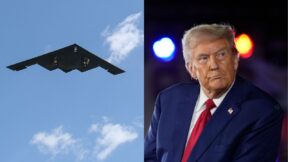Inside Pete Hegseth’s Chaotic Start At The Pentagon With CNN’s Natasha Bertrand
As the fallout continued from the Trump administration’s Signal chat scandal — in which Defense Secretary Pete Hegseth shared attack plans for strikes in Yemen in a messaging group that accidentally included The Atlantic’s editor in chief — CNN national security correspondent Natasha Bertrand and her colleagues published a sweeping report looking at how Hegseth, a former Fox News host, has been running the Pentagon. What they found was a pattern of chaos, insecurity, and performative leadership.
“For all of the sources we spoke to, the Signal Chat fiasco was really just underscoring Hegseth’s inexperience in general,” Bertrand told Mediaite editor Aidan McLaughlin on this week’s episode of Press Club. “He is very preoccupied with appearing very lethal, appearing, of course, very loyal to President Trump — and that has really rubbed a lot of defense officials the wrong way.”
Bertrand’s report painted a picture of a Defense Secretary more focused on optics than operations. One early Hegseth initiative was a sweeping and hasty DEI purge. “They rushed to take down tens and tens of thousands of articles and photos from across DoD websites,” Bertrand said. “They took down things related to suicide prevention, related to 9/11, related to Holocaust remembrance — many things that were clearly out of bounds.” Officials have since had to reverse course and begin republishing what was removed.
One defense official told CNN: “Of all the things they could be doing, the places they’re putting their focuses on first are really things that just don’t matter … This was literally a waste of our time. This does absolutely nothing to make us stronger, more lethal, better prepared.”
Another Hegseth move: deploying troops to the southern border. “He loves the visual and the optics of having the border look like a war zone,” Bertrand said. “But what they’re really doing, according to officials we spoke to, is standing around, putting up concertina wire… It’s a peaceful border for the most part. They are not in a war zone.”
Bertrand followed up that reporting with a new story over the weekend that found the military mission at the border has cost more than $300 million in six weeks.
As the Signal scandal dominated headlines, Bertrand’s reporting suggested that it was indicative of problems beyond sloppiness from the administration. “More than sloppiness, I see it as indicative of how they are still trying to shield themselves from an apparatus that they believe is still out to get them,” she said.
And inside the Pentagon? “There’s a lot of questions now about whether Hegseth is going to live up to those standards that he outlined in his confirmation hearing, where he said, look, even the most senior leadership — they need to be held to the same standard as the lowest-level service member,” Bertrand said. “It doesn’t seem that is how things are playing out now. There’s anger about that double standard.”
Yet Bertrand said Hegseth remains safe in his job for now. “He is shielded by virtue of the fact that no one wants to go through another confirmation battle,” she said. “In Trump’s eyes, it doesn’t seem he believes Hegseth did anything wrong.”
Mediaite’s Press Club airs in full Saturdays at 9 a.m. on Sirius XM’s POTUS Channel 124. You can also subscribe to Press Club on YouTube, Apple Podcasts, or Spotify. Read a transcript of the conversation below, edited for length and clarity.
Aidan McLaughlin: When The Atlantic first reported on this Signal chat, the line from the administration was that none of the information was classified. CIA Director John Ratcliffe, Director of National Intelligence Tulsi Gabbard, both told the Senate there wasn’t any classified information that was shared on this chat. Trump and the rest of the White House called Jeffrey Goldberg a liar. Then Jeffrey Goldberg goes ahead and publishes the messages. Were they classified?
Natasha Bertrand: The short answer is yes, according to multiple sources that we spoke to. The information that Hegseth has shared — it was classified at the time he shared it. And according to one of the people that we spoke to, information that was circulating within DoD at lower levels with this exact type of pre-decisional strike guidance, including, for example, the exact times, aircraft, the weaponry that would be used — that was marked classified when it was circulating inside DoD at the time. The other officials that we spoke to said, look, yes, this was classified, especially because he was sharing it before the strikes took place.
And if you work at DoD, if you’ve covered DoD, that operational security around these kinds of pilots and airplanes — there are people on these ships that are launching Tomahawk missiles — their security is paramount to everything that department does, and they’re extremely careful not to disclose any information prior to that operation that could put them at risk. And the fact that, according to The Atlantic’s timestamps here, that they took from that Signal chat, Hegseth apparently disclosed all this information about 30 minutes before the first strike happened — that in and of itself is an indication that this was classified at the time.
Pete Hegseth wrote in one message in the chat, “OPSEC is clean,” which is wonderful thing to say in a chat that the editor in chief of The Atlantic is a part of.
That was an unfortunate choice of words for him.
Now, you’ve covered this stuff a lot. What’s the big deal with sharing these kinds of messages in this very insecure manner? Why should people care about something like this?
Well, I think precisely because of what we saw happen. It’s easy for someone who’s not supposed to be in this type of chat to enter the chat. And the reason why these senior officials are always using highly secure devices and talking about this classified information in highly secure spaces, where there aren’t even cell phones allowed, is precisely because there’s always a risk here if you’re discussing this in unclassified open spaces — that someone could see it that’s not supposed to. And then you have the separate issue, of course, of whether these phones, which are not necessarily secure, could be hacked. You have the added question of how this information even got onto a device that has Signal on it.
All of this is evidence, according to our sources, of how Hegseth really values optics over any substance and security. This has been a theme of his entire tenure as Secretary of Defense. He wanted to brag about how this operation was going to play out. No one else in the chat asked for those operational details. He volunteered them on this platform. And now, of course, he’s having to deal with the consequences of that.
You’ve covered high-level intelligence leaks before. Does this rank among the sloppiest you’ve seen at this level of government? How abnormal is this?
Extremely, because I’ve covered defense for several years now in the Pentagon, and all of the leaks that we have seen previously, and I’m thinking specifically about, for example, the massive leak that we saw from Jack Teixeira, who was that airman who leaked a whole bunch of really classified documents online. Those were done by very low-level people. These are not senior leaders who are accidentally disclosing — or purposefully disclosing — classified information.
So in terms of the level of this, and the irony that it came out a few days after the Department of Defense said that they were going to start a big leak investigation using polygraphs to try to determine how classified information was getting to the media, is extremely ironic, but also underscores the slapdash nature of much of what’s been going on here — to include, of course, the use of Signal, which is an encrypted application. Sure, it’s good to communicate securely, but when you’re talking about this level of operational detail, it’s not.
Is this indicative of the administration’s general sloppiness, or do you see this as a mistake that could have happened in any other administration under another cabinet?
More than sloppiness, I see it as indicative of how they are distrustful of the entire government apparatus that they still consider to be primarily the “deep state” — even though they are now the government — that they feel the need to move off of these secure systems that they are all given and they are encouraged to use to talk about this stuff, to Signal, where they can pick and choose who they’re gonna talk to. It’s shielded from any records retention laws; it’s all still very within their control.
And I think that more than any sloppiness — which, if you ask any expert, if you asked any official, they will say, yes, this was careless — it’s more about how they’re still trying to shield themselves from an apparatus that they believe is still out to get them. That’s my main take.
I want to talk about this CNN report you had about Pete Hegseth and his tenure so far at the Department of Defense. It quotes a ton of sources, both current and former defense officials, who paint this picture of an inexperienced leader who has been mostly preoccupied with visual shows of strength. There is an example of sending a bunch of troops to stand around at the southern border. There was this fixation on making sure that web pages that seemed anywhere related to DEI were scrubbed. Tell us what you reported.
For all of the sources we spoke to, the Signal Chat fiasco was really underscoring Hegseth’s inexperience in general. And also his real obsession with optics and appearances over substance, as I mentioned before. A lot of the initiatives that he spearheaded here, including the really high-profile ones — the DEI purge, the troops to the southern border — a lot of that has been dramatically scaled back in recent weeks because, again, he is not used to operating within this massive bureaucracy, and he hasn’t gotten his footing.
I think one of the most obvious examples of this was the DEI purge. They rushed to take down tens and tens of thousands of articles and photos from across DoD websites, something that took much time for individual troops to do, taking away from tasks that many of them argued were more important than doing this very tedious thing. And ultimately, of course, they all went way too far with it because they were concerned about potentially running afoul of this memo that Hegseth put out saying, “Hey, anything DEI, take it down,” which, of course, was very vague in and of itself. They took down things related to suicide prevention, related to 9/11, related to Holocaust remembrance — many things that were clearly out of bounds here because they were moving fast and breaking things, and they had to reverse it. Now they’re taking a look at it and saying, “Look, we’re going to republish a lot of this stuff.”
Then you have one of the signature moves, which was the massive troop surge to the southern border, the military deportation flights, Gitmo, holding migrants at Gitmo. Well, it turns out that for the military deportation flights and Gitmo, DHS is now saying, “We don’t really need the military,” because we can handle it. And now the U.S. military is having to pull back a lot from those flights. There’s only about one a week at this point with a handful of migrants. Gitmo is basically empty. And as far as the troops at the southern border, again, you have this massive presence there, because Hegseth loves the visual and the optics of having the border look like a war zone. But what they’re really doing, according to officials that we spoke to, is standing around, putting up concertina wire, putting up barriers, and essentially taking them away from exercises that could be helping them be more combat-ready. It’s a peaceful border for the most part. They are not in a war zone. So that’s also a part of this.
And I think in general, we’ve seen Hegseth — he travels with a large army of bodyguards. He had two heavily armed troops guarding his plane at Joint Base Andrews the other day, a base in Maryland. He is very preoccupied with appearing very lethal, appearing, of course, very loyal to President Trump, and that has really rubbed a lot of defense officials the wrong way. They’re like, “Look, he’s prioritizing the wrong stuff here.”
Did you get a sense that there was a lot of anger amongst officials at the Defense Department at what Pete Hegseth is doing — whether it’s for these things that you’ve laid out or the Signal screw-up? A lot of attention is being paid to Mike Waltz, who accidentally added Jeffrey Goldberg to the chat, but you could argue that what Pete Hegseth did was far worse.
I think that’s exactly right. There’s a lot of anger inside the Pentagon at how Pete Hegseth could do this and not essentially have any consequences for it. Whereas a lower enlisted person — for example, a very low-level service member — might do this and they would get court-martialed. And that’s part of the reason why one defense official told me, look, even my most junior analyst knows not to do this.
And there’s a lot of questions now about whether Hegseth is going to live up to those standards that he outlined in his confirmation hearing, where he said, look, even the most senior leadership — they need to be held to the same standard as the lowest-level service member. It doesn’t seem that is how things are playing out now.
There’s anger about that double standard, but there’s also a lot of confusion inside the Pentagon about all of these different directives and how many of them are getting pulled back or reconsidered. For example, the transgender troop ban. Obviously, that was a President Trump directive, but Secretary Hegseth had to figure out how to execute that, and it’s already been reversed in the courts. And now transgender troops are in limbo about that. The DEI purge — needless to say, everyone’s confused about what they’re supposed to leave up versus take down. The military flights — people are like, are those continuing, are they not? So there’s a lot of confusion about what Hegseth wants and the substance of what he wants versus how much of this is performative for President Trump, and the lower rank and file can keep doing what they have been doing and hope to avoid his gaze.
Trump seems to be standing by Waltz and Hegseth. Do you think they will face any consequences for this?
It doesn’t seem so. At least from Secretary Hegseth’s perspective, it doesn’t seem he is in danger at this point because the confirmation process — it sucks. No one wants to go through that again. So he is shielded by virtue of the fact that unless he did something that, in Trump’s eyes, was extremely egregious, they don’t want to go through another confirmation battle. And Trump is standing behind Hegseth at this point, saying Hegseth had nothing to do with the Signal chat fiasco. That is baffling in and of itself because, of course, Hegseth — as you said earlier — arguably had the most egregious security breach as part of that Signal chat, outlining, again, the timing of the Houthi strikes, types of aircraft, etc. But it doesn’t seem he’s in any real danger at this point because no one wants to confirm a new Secretary of Defense, and in Trump’s eyes, it doesn’t seem he believes Hegseth did anything wrong.
After watching the Senate hearings, it certainly seems the CIA Director and the Director of National Intelligence were not forthcoming on this. Nadler is calling for them to be prosecuted for perjury. Is that going to happen?
It’s interesting because I believe it was Senator Ossoff who said that they are going to get the full chat log, which Jeff Goldberg — apparently — did disclose ultimately. And they’re going to check that against the testimony of Gabbard and Ratcliffe and see if there were any discrepancies. I think that Ratcliff and Gabbard were very careful in how they played this. They essentially tried to differentiate between the intelligence that their agencies had classified and considered classified and that which the Department of Defense was responsible for classifying or declassifying.
So they were essentially trying to push the blame to Secretary Hegseth during those hearings, and they were saying, look, if you have questions about what he posted, that’s a Department of Defense issue because he is original classification authority. He could have declassified it if he wanted to — all of this stuff. So, they were being very careful in how they answered the questions. Tulsi Gabbard did say there was nothing classified shared, but she caveated that by saying, from DNI’s perspective, there was nothing classified shared. So they kind of protected themselves. It’s unclear how much the Senate and the House are gonna buy that, but they did try to shift a lot of the blame tags.
The administration floated a few novel theories on why this is a hoax. The first one that I saw was that The Atlantic had two different headlines. The first headline described them as war plans, the second headline described them as attack plans. Does that make any difference in what we’re talking about here?
I don’t understand the distinction that they’re trying to make, because you can make the argument that war plans are less sensitive than what Hegseth did end up sharing. Because war plans are essentially what Elon Musk — according to The New York Times — was set to receive from the Pentagon when he went there for a briefing, which were overarching plans that maybe in the event of a war, the U.S. would undertake in order to potentially carry out a war against China. But that’s not real yet. We’re not in a war, but the Department of Defense does create certain plans for certain contingencies to be prepared in the event of one.
But this was a real-world scenario. This was happening in about 30 minutes from when Hegseth was disclosing them. This pilot’s already up in the air, circling and likely getting ready to strike because they are in the air usually for a good amount of time before they carry out their operations. So these were arguably more sensitive because they were imminent, versus something that would be, for the time being, theoretical like a war plan would be.
Another argument that Pete Hegseth is making is that these were live updates and nothing more than that. Does that hold water at all?
No, because they weren’t. The timestamps very clearly showed that they were not simultaneous to the actual attack. So Hegseth first messaged the group — according to The Atlantic chat — at 11:44 AM that the first bombs were going to drop, essentially, at 12:15 PM. That was about 30 minutes beforehand that he disclosed this information. So it was not simultaneous. It was not while the operation was underway.
But even if it had been, DoD takes great pains to not confirm an operation, where U.S. service members are conducting an op where they could still be in harm’s way, until it is successful, until it is over. And even if this were to be disclosed during the time, that still, according to defense officials, would not be kosher — because again, until they are fully out of harm’s way, it is not considered a complete success, over and done with, and safe to share.
CNN aired a montage of people who were in the group chat — Marco Rubio, Mike Waltz — saying that there should be prison time for mishandling classified information. As someone who’s covered this for a long time, what is it like to watch defenders of Trump say, “Oh, the strikes were a success, so we shouldn’t get caught up, bogged down, or complain about the way that this was handled.”
First of all, we have no idea what they mean when they say the strikes were a success because the Houthis are still launching missiles today. This morning, they hit — they tried to hit, I should say — Israel’s Ben-Gurion Airport, and they didn’t succeed, but they’re still not deterred. They’re still launching stuff.
But secondly, this is the thought experiment that I always like to do: what if Secretary Austin had done this? What calls for recriminations would we be seeing from people — Secretary Hegseth or Donald Trump — if Lloyd Austin had been on a Signal chat sharing highly classified updates about an impending Houthi operation outside of a secure area? I think that their reaction would be extremely different, I think that’s safe to say.
So yeah, it is very jarring. And I think that’s the sense that we’re getting from defense officials that we speak to in the building every day, like again, even the most junior person knows not to do this. Defense officials have to do OPSEC training regularly.
What has it been like covering the Pentagon under this administration?
Yeah, it’s been challenging in different ways because CNN is no longer allowed, for example, to use our booth in the Pentagon, which is not the best, most ideal situation. But it doesn’t change —
Is that a live booth or where you’re stationed and working?
Yeah, this was the booth that we had in DoD to be able to turn on our camera and go live, and that was taken away from us, according to the Pentagon, because they wanted to do a new media rotation and they wanted to give other outlets to use it. So that’s made our job more challenging, but it hasn’t changed the fundamental way that we’re doing it, which is, hey, we’re still going to the Pentagon every day. We’re still talking to people. Having office space really does not change that fact. So, throwing things in our path — we’ve been able to surmount those. The sheer volume, of course, of news has been on steroids. Even having covered the first Trump administration, this has been a lot. It’s exciting because there’s a lot of accountability journalism to be done. There are a lot of things like this that happen where it’s shocking. But it’s why we go into this. It’s part of the job. So we’re trying to do the best we can. We’re not barred from the Pentagon, so we’ll keep going in and doing what we can.
New: The Mediaite One-Sheet "Newsletter of Newsletters"
Your daily summary and analysis of what the many, many media newsletters are saying and reporting. Subscribe now!






Comments
↓ Scroll down for comments ↓